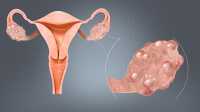MedicalResearch.com Interview with:
Mojca Jensterle
Department of Endocrinology. Diabetes and Metabolic Diseases. University Medical Centre. Zaloska 7. Slovenia.
MedicalResearch: What are the main findings of the study?
Answer: This is the first report demonstrating that selective phosphodiesterase enzyme (PDE) 4 inhibitor roflumilast added to metformin (MET) was superior to metformin alone in reducing mean body weight after 12 weeks of treatment in obese women with polycystic ovary syndrome (PCOS), primarily due to a loss of fat mass.
31 women with
PCOS diagnosed by the National Institute of Child Health and Human Development criteria aged 33.8 ± 7.4 years with BMI 36.4 ± 5.1 kg/m
2concluded the study. They were randomized to MET 1000 mg BID or combined treatment (COM) with MET 1000 mg BID and roflumilast 500 mcg QD. The primary outcome were changes in anthropometric measures of obesity.
At study endpoint subjects treated with COM lost on average 4.2 ± 2.8 kg compared to a 0.9± 2.5 kg weight gain in METgroup (p<0.001). BMI decreased for 1.6 ± 1.1 kg/m
2 in COM arm compared to increase for 0.9 ± 2.4 kg/m
2 in MET arm (p= 0.001). Total body fat decreased for 0.7±0.4 % in COM as opposed to 0.2 ± 0.1 % increase in MET and visceral adipose tissue (VAT) area as assessed by DXA decreased for 15.5 ± 1.6 cm
2 in COM as opposed to 11.4 ± 5.3 cm
2 increase in MET. The greater
waist circumference reduction was noted in COM (4.2 ± 1 cm) compared with MET (0.8 ± 0.7 cm). The improvements of obesity measures were associated with beneficial effects on fasting glucose levels, insulin resistance and resolution of metabolic syndrome in affected women.
The hypothesis behind the weight decrease and beneficial metabolic impact observed with roflumilast is based on the PDE4 regulation of signaling pathways linked to GLP-1 release. In experimental rodent model a single treatment with roflumilast enhanced plasma GLP-1 levels up to 2.5 -fold.
(more…)







